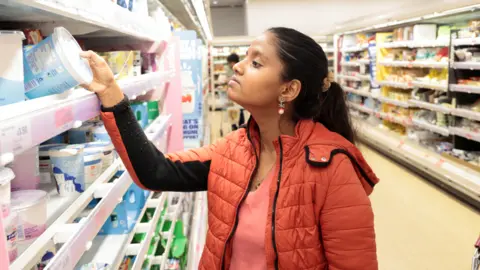Supermarkets told to make pricing clearer to help shoppers
 Getty Images
Getty ImagesSupermarkets have been told to make their pricing clearer to help shoppers find the best deals.
The Competition and Markets Authority (CMA) said unclear pricing could be making it difficult for people to compare products.
The watchdog said retailers should "make the necessary changes" and also called on the government to bring in reforms to tighten the law.
Supermarkets said they would reflect on the CMA's recommendations.
Its findings follow a review into how grocery retailers display unit pricing information in store and online.
It said that in some instances the same type of product was priced per unit using different metrics, "making it hard for shoppers to compare prices on a like-for-like basis".
For example, it found tea bags priced per 100g for some products and others priced per tea bag.
Sarah Cardell, chief executive of the CMA, said: "We've found that not all retailers are displaying prices as clearly as they should, which could be hampering people's ability to compare product prices.
"We're writing to these retailers and warning them to make the necessary changes or risk facing enforcement action."
Under current rules, most products should be priced per unit either by kilogram or by litre. But the CMA found examples of retailers using grams and millilitres.
The watchdog discovered a lack of transparency with missing or incorrectly calculated unit pricing information both in store and online. Examples include a 250ml bottle of handwash that was sold for £1.19 but was mistakenly priced at £476.00 per 100ml.
It also raised concerns about unit pricing information being too small to read and some retailers not displaying unit prices for any products on promotion.It added that some of the problems "stem from the unit pricing rules themselves", which fall under the Price Marking Order, saying the rules allowed "unhelpful inconsistencies in retailers' practices and leave too much scope for interpretation".
Sue Davies, head of food policy at the consumer group Which?, said supermarkets must "urgently act" on the areas highlighted by the CMA.
"This includes the need to put unit pricing on promotions, such as on loyalty card offers and multi-buys, and make unit pricing clearer and more consistent," she said.
She added that the the government must "act swiftly on its promise to update pricing rules and close the loopholes that are allowing supermarkets to unnecessarily confuse shoppers".
Competition
While food price inflation remains at historically high levels - 17.3% in June - the watchdog said evidence it had collected indicated that competition issues had not been driving this.
Ms Cardell told the BBC the CMA had found no evidence of profiteering on groceries, but said it was important to keep the market "under review" as the sector seeks to rebuild profits.
It found that operating profits in the grocery sector fell by 41.5% in 2022-23, compared with the previous year, while average operating margins fell from 3.2% to 1.8%.
This was due to retailers' costs increasing faster than their revenues, indicating that rising costs have not been passed on in full to consumers, the CMA said.
It pointed to evidence that budget supermarkets Aldi and Lidl had gained market share, suggesting that supermarkets were "restricted in their ability to raise prices without losing business".
However, it said that not everyone was able to benefit fully from strong competition, "particularly those who cannot travel to large stores or shop online, and therefore may rely on higher-priced convenience stores".
The CMA said so far it had looked at competition overall between retailers but had not yet looked at individual product categories or across the wider grocery supply chain.
It said it would now further analyse 10 product categories: baby formula, milk, bread, pet food, poultry, mayonnaise, baked beans, chilled desserts, ready meals, and lemonade.
It added it did not have any provisional concerns that competition for these products was ineffective.
Helen Dickinson, chief executive of the British Retail Consortium, which represents supermarkets and other retailers, said: "Supermarkets have been working hard to support their customers through the cost of living crisis and will be reflecting on the CMA's recommendations on unit pricing.
"The CMA itself notes that 'many of these problems stem from the rules themselves', and retailers stand ready to support proposed changes to the unit pricing rules."
The government said it welcomed the findings into competition and unit pricing, and said it would launch a consultation in the autumn on the Price Marking Order "to make it work for consumers".
Chancellor Jeremy Hunt said: "It's reassuring that competition between supermarkets is working, but the CMA has my backing to look further into price rises for 10 everyday essentials."

How can I save money on my food shop?
- Look at your cupboards so you know what you have already
- Head to the reduced section first to see if it has anything you need
- Buy things close to their sell-by-date which will be cheaper and use your freezer


Sign up for our morning newsletter and get BBC News in your inbox.

